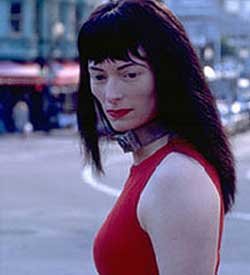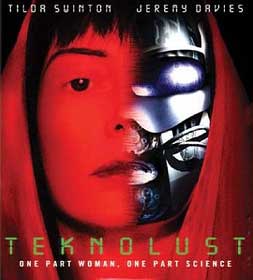What a wonderful, wonderful tour de force from Tilda Swinton! There've been many films in which one actor plays two or more characters, & even when it is done well there are some built-in problems: Actors pretending to be looking at their own twin tend to convey that they are looking at nobody in front of them, & actors who are superimposed beside themselves never stop looking like the same actor superimposed beside themselves.
 But Tilda has doen a rare thing. She has created distinct vocal inflections, facial expressions, & body language for four different characters. It isn't the color-coded costuming & cheap-looking wigs that make these characters distinct. It certainly isn't the body-doubles trying to hide their faces inside the cheap-looking wigs. It works wholly because of Tilda's fantastic level of acting skill. The director on the commentary track said that some viewers actually didn't realize one person played all four central characters, & I can believe it. But Tilda has doen a rare thing. She has created distinct vocal inflections, facial expressions, & body language for four different characters. It isn't the color-coded costuming & cheap-looking wigs that make these characters distinct. It certainly isn't the body-doubles trying to hide their faces inside the cheap-looking wigs. It works wholly because of Tilda's fantastic level of acting skill. The director on the commentary track said that some viewers actually didn't realize one person played all four central characters, & I can believe it.
It's a tale of cloning. Some critics foolishly attacked the technology of the film, knowing a little about cloning & detecting Teknolust gets it wrong. Really the story regards a fantastic combination of cloning technology & nanobot technology. This imaginary technology allows the virtual world possible with artificial intelligence inside a computer to crossover into the physical world. It mixes cloning technology with Matrix virtual reality. It's pure fantasy & the critics who didn't realize the clones were partly machines just weren't paying attention.
However, it is not easy to assess this film because it is so unique there are few touchstones for comparison. Discussing the cience as literal is folly, but a discussion of the characters & the metaphoric content would likewise fail wholy to convey how interesting it all is. As a science fiction story it is more interested in character development than its virtual reality cloning technology, but it does have some pretty decent pseudo-science storytelling notions tucked in & around the tale. It's a great script very cleverly constructed visually, but it could all have fallen to pieces if not for the stunning quadruple performance of Tilda Swinton.
Dr. Rosetta Stone is a mousy genetic engineer who has developed a method of viral duplication of humans combining computer viruses with nanobot & cloning technology, which she says is "as easy as baking brownies." She has used her own DNA as the pattern to build three "improved" duplicates of herself. Though initially believing she was creating enslavable automata that would perform menial labor to make human lives easier, what she ended up with were three very independent willful daughters.
The eldest is black-haired Ruby who dresses only in red. She has a burdensome sense of responsibility, being the only clone who can interface with "the jungle" of the real world. She sets out nightly seducing men & collecting their semen, which the three girls need to ingest as a tea or soup in order to stay alive. This odd notion is given some pseudo-scientific context, but as the story begins Ruby is really more of a semen-vampire. She & her "sisters" need the semen as vampires need blood, but unfortunately she leaves her seduced partners infected with a virus that renders them impotent & sterile.
The youngest clone is blonde Marinne who dresses only in blue. She is the baby of the family & very pliant. The middle clone is red-haired Olive who dresses only in green. She is the most like an actual teenager, rebellious against the restrictions Rosetta as mother-figure imposes on the clones.
Olive & Marinne have a lesbian relationship which fullfils their deep need for physical contact, but Ruby is alone, a sexual predator unable to bond with partners, driven by the same need for physical contact but also by her responsibility to acquire the semen they all live on. Ruby also runs a virtual sex website that supports Dr. Rosetta's research, & permits her a surprisingly poetic outlet.
Rosetta loves her "children" but has to keep their existence a secret, which becomes just about impossible when it is discovered that a self-replicating virus is spreading among men who have only one thing in common, an anonymous sexual partner.
The film is developed as a comedy but the characters are so credible, likeable, & interesting that it isn't laugh-out-loud, their predicament is just too disconcerting. It is more droll than a laugh riot, though it had me giggling here & there. It would be easy to watch it as entirely serious.
Ruby means no harm, but is a danger to the public. The other two clones who are not permitted to interact in the "jungle" are beginning to feel like prisoners, & begin to disobey Rosetta sneaking out for adventures. Like any other child entering adulthood, these clones do need their independence.
Rather than following the plot-thread of the girls' potential threat to humanity, they eventually develop immunities to the virus that can be shared with men, as this is not a thriller or horror story. As they cease to be a threat to humanity the real thrust of the story asks how or when Ruby will learn to bond with a partner & cease to be only a predator, & how the incestuous lovers Olive & Marinne can achieve the independence they must have as they become more fully human.
One minor plot glitch is how the girls apparently evolve & adapt to no longer be semen-vampires, so that they can thrive on color-coded but otherwise ordinary food. It appears that Ruby has weaned herself off her previous diet & onto one of donuts & borsch, so it seems likely the other two will likewise have human diets eventually, freeing them from their dietary restriction & permitting integration into society.
By the end of this strange story it seems likely they will be able to fully individuate & live separately from Rosetta, & Rosetta's own virgin life finds romance so that the clones feel she has finally matured enough that her daughters can seek their own liberty without it being a betrayal to their mother.
There's a lovely relationship that develops between ultra-sexy Ruby & a sweet little dufus named Sandy (Jeremy Davies, whose borderline-loony character is as excellently played as anything from Tilda). Ruby looks like an amazon towering over this little guy who still lives with mommy & has a loser-job in a print shop. Dufus & sex-goddess are as mismatched as any couple can be. But golly they're cute together. On the level of a science fiction story, it makes perfect sense that a clone more or less raised in a basement by an uptight virgin would not share with the general population the same expectations of what constitutes an ideal lover. Ruby evolving into a healthy if very odd woman in love with a sweet young goofball is a good sign.
This is overtly a feminist science fiction story & probably has a bit more for women than men, but no reason for non-feminists to be put off since the story is ultimately very much in favor of both sexes. If assessed as a satire instead of as science fiction, the film gets even better, poking great fun at social norms, technology, & gender politics, while always full of human affection.
copyright © by Paghat the Ratgirl
|

 But Tilda has doen a rare thing. She has created distinct vocal inflections, facial expressions, & body language for four different characters. It isn't the color-coded costuming & cheap-looking wigs that make these characters distinct. It certainly isn't the body-doubles trying to hide their faces inside the cheap-looking wigs. It works wholly because of Tilda's fantastic level of acting skill. The director on the commentary track said that some viewers actually didn't realize one person played all four central characters, & I can believe it.
But Tilda has doen a rare thing. She has created distinct vocal inflections, facial expressions, & body language for four different characters. It isn't the color-coded costuming & cheap-looking wigs that make these characters distinct. It certainly isn't the body-doubles trying to hide their faces inside the cheap-looking wigs. It works wholly because of Tilda's fantastic level of acting skill. The director on the commentary track said that some viewers actually didn't realize one person played all four central characters, & I can believe it.